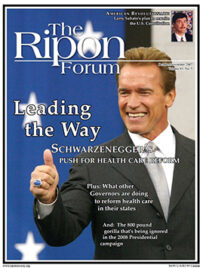
As most everyone knows, the problem of the uninsured touches communities all across our country.
Thankfully, we have made tremendous strides in dramatically lowering the number of uninsured children through SCHIP which, time and again, has proved to be both a successful program and a saving grace for millions of American families who otherwise simply could not afford to pay for their children’s health care.
The stakes could not be more monumental. The quality of the health care that one receives as a child can have dramatic implications later in life. And there is not a family in America who does not want to provide the most comprehensive health coverage possible for its children.
While some may mistakenly characterize SCHIP coverage as a welfare benefit, what they may not realize is that nearly 90 percent of uninsured children come from families where at least one parent is working. Today, fewer than half of parents in families earning less than $40,000 a year are offered health insurance through their employer – a 9 percent drop since 1997. And for many working families struggling to obtain health care, if benefits are even accessible to them, the costs continue to rise, moving further out of their reach.
In my own state of Maine, a family of four can expect to pay $24,000 on the individual market for its coverage. For most families, taking this path is unrealistic and unworkable, especially when factoring the cost of mortgages, heating bills, and myriad other financial pressures. With lives literally hanging in the balance, we ought to be building on what works.
We are the wealthiest Nation on Earth, and if we are unable to provide health insurance and medical care to our young people, then what does that say about our values.
Regrettably, we have heard a litany of reasons why we shouldn’t cover more children through SCHIP. Some have expressed concerns about the size and cost of the package. I would respond that it should inject a dose of reality on the magnitude of the problem. States have responded to the call of families who are struggling every day with the cost of health insurance and are assuming a tremendous burden in the absence of Federal action.
In addition, we should bear in mind that this bill is $15 billion below the amount we provided for in the budget resolution. Again, this bill is the product of compromise. Some of us wanted to go further. Senator Jay Rockefeller (D-WV) and I, for example, introduced legislation to reauthorize the program at the full $50 billion — a bill that garnered 22 bipartisan cosponsors.
Although there were compromises made along the way on various policy positions, one point is not up for discussion — simply maintaining the status quo of current levels of coverage is unacceptable. And while the Congress and the White House argue over philosophical differences, children are either going without coverage, or their parents are financing their care on credit cards, hoping they can stay on top of their debt.
We are the wealthiest Nation on Earth, and if we are unable to provide health insurance and medical care to our young people, then what does that say about our values?
Some of my colleagues contend that the SCHIP reauthorization we are considering is the first step toward government-run health care and that we will substitute public coverage for private insurance. The fact is that this SCHIP program came into being ten years ago. We haven’t seen that evolve from the SCHIP program. We didn’t see it materializing into a government-run health care program, as many have alleged here today. It absolutely hasn’t happened. What we did was identify a need and address it in a bipartisan manner.
These claims ignore the fact that today 73 percent of the children enrolled in Medicaid received most or all of their health care services through a managed care plan. In fact, America’s Health Insurance Plans, AHIP, a national association representing nearly 1,300 member companies, has recently endorsed this legislation, stating “it repairs the safety net and is a major movement toward addressing the problems that States and Governors have been trying to address, which is how to get access for children.’’ The bill also helps shore up employer-based coverage by granting states the option to subsidize employer-sponsored group health coverage for families that find the coverage beyond their financial means.
Some have also argued that SCHIP should reduce coverage for adults, especially childless adults. While I believe that coverage for adults can have a clear benefit for children – both in terms of enrollment of children as well as the simple fact that health problems for a working parent can lead to economic insecurity for the family – this approach represents an area where we had to compromise. But I find it contradictory that the Bush Administration, which has been so vocal in its opposition to the cost and scope of the compromise package, granted the majority of the fourteen adult coverage waivers granted over the past ten years and renewed a waiver for adult coverage in May!
Frankly, I believe the President’s decision to veto this bill is an outrage, and a decision that seriously misjudges the genuine concern Americans have about access to care — particularly for children. In a March New York Times/CBS News poll, 84 percent of those polled said they supported expanding SCHIP to cover all uninsured children. A similar majority said they thought the lack of health insurance for many children was a “very serious’’ problem for the country.
SCHIP has been the most significant achievement of the Congress over the past decade in legislative efforts to assure access to affordable health coverage to every American. We must not undermine the demonstrated success of this program over the past decade.
Compromise on both sides of the aisle helped us create this program ten years ago, and, hopefully, a renewed sense of bipartisan commitment will help us overcome the objections before us and successfully reauthorize this vital program.
Olympia J. Snowe represents the State of Maine in the U.S. Senate. She serves on the Health Subcommittee of the Senate Finance Committee.




